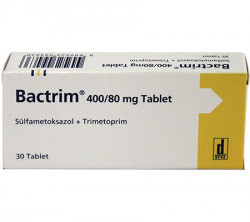Bactrim (sulfamethoxazole and trimethoprim) Coupons and Discounts
Bactrim is an antimicrobial agent, consisting of sulfamethoxazole and trimethoprim combination. One way to save money on the Bactrim (sulfamethoxazole/trimethoprim) retail cost regardless of income and insurance status is to use Bactrim (sulfamethoxazole/trimethoprim) coupons or discount cards from RXCoupons. Use our Bactrim (sulfamethoxazole/trimethoprim) coupons at your online pharmacy and receive up to 75% off the sale price each time you refill your prescription.
Pharmacological action of Bactrim (sulfamethoxazole/trimethoprim)
Bactrim is an antimicrobial agent, consisting of sulfamethoxazole and trimethoprim combination. This antibacterial drug is similar in activity with other sulfonamides. Bactrim is highly active against streptococci, meningococci, staphylococci, gonococci, Escherichia coli, Salmonella, Vibrio cholerae, Haemophilus, Listeria, enterococcus faecalis, Brucella, Shigella, Yersinia, Morganella, Chlamydia and other pathogens. The therapeutic effect of the drug lasts for 7 hours.
Bactrim is produced in the form of solution, syrup, tablets, suspension for children.
Medical use of the drug
Bactrim is used to treat the following diseases: - Infections of the genitourinary system: cystitis, urethritis, pyelonephritis, granuloma inguinale, gonorrhea, prostatitis, pyelitis, epididymitis, lymphogranuloma venereum (LGV); - Gastrointestinal infections: gastroenteritis, cholera, cholangitis, typhoid, cholecystitis caused by strains of Escherichia coli, dysentery, paratyphoid; - Infections of upper respiratory tract: tonsillitis, sinusitis, otitis media, scarlet fever, laryngitis; - Lower respiratory tract infections: pneumonia, chronic and acute bronchitis, bronchiectasis; - Infections of skin: pyoderma, acne, wound infections, abrasions; - Other disorders: osteoarticular infections, brucellosis, toxoplasmosis; malaria.
Bactrim (sulfamethoxazole/trimethoprim) dosage and administration
The drug should be taken after meals two times a day (usually in the morning and in the evening), with plenty of water.
Children older than 12 and adults should take 4 tablets (or 8 tablespoons of syrup) daily.
Children under 12 should take Bactrim suspension or syrup. The dose for suspension is ½-2 measuring spoons two times a day (depending on the patient’s age).
The course of treatment may last from 5 days up to two weeks. The treatment may be longer in case of a chronic infection. The exact dosage should be determined by the doctor.
Side effects of Bactrim (sulfamethoxazole/trimethoprim)
Bactrim has the potential to cause side effects: Digestive system: abdominal pain, vomiting, appetite loss, nausea, diarrhea, pseudomembranous colitis, gastritis, stomatitis, hepatitis, cholestasis. Haematopoiesis: megaloblastic anemia, neutropenia, leukopenia, agranulocytosis, thrombocytopenia. Musculoskeletal system: myalgia, arthralgia. Respiratory system: bronchospasm, pulmonary infiltrates. Nervous system: dizziness, headache. Urinary system: interstitial nephritis, increased urea concentration, impaired renal function, hematuria, polyuria, toxic nephropathy, oliguria, anuria, crystalluria, hypercreatininemia. Other reactions: tremors, depression, apathy, peripheral neuropathy.
Bactrim (sulfamethoxazole/trimethoprim) contraindications
Do not use Bactrim in case of sensitivity to the main components of the drug and sulfanilamides, in case of renal and hepatic failure, leukopenia, anemia, agranulocytosis, during pregnancy and lactation. Bactrim may cause hyperbilirubinemia in children. Bactrim should be used with care in the diseases of the thyroid gland, bronchial asthma, acid folic deficiency. The drug is not prescribed if the baby has been born preterm and during the first six weeks of life.
How to use Bactrim (sulfamethoxazole/trimethoprim) during pregnancy
The active components of Bactrim may affect folate metabolism during pregnancy Therefore, Bactrim should be used only if the expected benefit exceeds the potential risk to the fetus. Pregnant women using Bactrim should also take 5-10 mg of folic acid per day. Women should avoid using the drug in the last three months of pregnancy (your baby may be at risk of developing kernicterus).
The active components of Bactrim have low absorption into breast milk. Nevertheless, it is recommended to avoid adverse outcomes for the mother and baby and stop breastfeeding while taking this medication.

